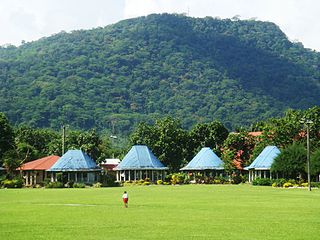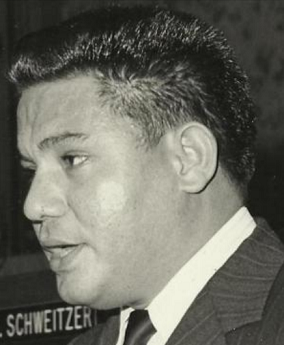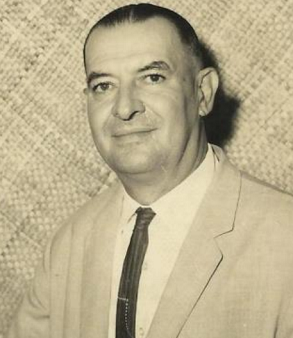
Politics of Samoa takes place in a framework of a parliamentary representative democratic state whereby the Prime Minister of Samoa is the head of government. Existing alongside the country's Western-styled political system is the fa'amatai chiefly system of socio-political governance and organisation, central to understanding Samoa's political system.

AfiogaFiamē Naomi Mataʻafa is a Samoan politician and High Chiefess (matai) who has served as the seventh Prime Minister of Samoa and leader of the Faʻatuatua i le Atua Samoa ua Tasi (FAST) party since 2021.

Fiamē Mataʻafa Faumuina Mulinuʻu II was a Western Samoan paramount chief and politician. The holder of the Mataʻafa title, one of the four main Samoan chieftainships, he became the first prime minister of Western Samoa in 1959, serving until 1970. He held the position again from 1973 until his death in 1975.

Ātua is an ancient political district of Samoa, consisting of most of the eastern section of Upolu and the island Tutuila. Within Samoa’s traditional polity, Ātua is ruled by the Tui Ātua together with the group of six senior orators of Lufilufi and 13 senior matai from throughout Ātua, comprising the Fale Ātua. The fono (meeting) of Atua's rulers takes place in Lufilufi on the great malae of Lalogafu'afu'a.

Fa'amatai is the indigenous political ('chiefly') system of Samoa, central to the organization of Samoan society. It is the traditional indigenous form of governance in both Samoas, comprising American Samoa and the Independent State of Samoa. The term comprises the prefix fa'a and the word matai.

Matāʻafa is one of the four paramount tama-a-ʻaiga titles of Samoa. It is one of two such titles originating from the Atua district at the east end of Upolu island and has its historical seat in the village of Amaile. Prominent holders of the title include Matā'afa Iosefo of Falefa, one of the three rival candidates for the kingship of Samoa during the early colonial period, Matāʻafa Faumuina Fiame Mulinuʻu I of Lepea and Lotofaga, who became leader of Samoa's pro-independence Mau movement after Tupua Tamasese Lealofi III's assassination; and his son Fiame Matāʻafa Faumuina Mulinuʻu II (1921–1975), the first Prime Minister of Samoa.

Lepea is a village on the island of Upolu in Samoa. The picturesque settlement of round Samoan houses built in a concentric pattern in large open grounds (malae) is situated 5mins drive west of the capital Apia on the north central coast of the island. It is part of the Tuamasaga electoral district.

General elections were held in Western Samoa on 4 April 1964, the first since independence in 1962. All candidates ran as independents. Following the elections, Fiamē Mataʻafa Faumuina Mulinuʻu II remained Prime Minister.

General elections were held in Western Samoa on 25 February 1967. All candidates ran as independents and voting was restricted to Matai and citizens of European origin, with the Matai electing 45 MPs and Europeans two. Following the election, Fiame Mata'afa Faumuina Mulinu'u II remained Prime Minister.

General elections were held in Western Samoa on 24 February 1973. All candidates ran as independents and voting was restricted to matai and citizens of European origin, with the matai electing 45 MPs and Europeans two. Following the election, Fiame Mata'afa became Prime Minister for a second term, having previously held the office between 1959 and 1970.

General elections were held in Western Samoa on 21 February 1976. All candidates ran as independents and voting was restricted to Matai and citizens of European origin, with the Matai electing 45 MPs and Europeans two. Following the election, Tupuola Efi became Prime Minister.

Tui Ātua Tupua Tamasese Lealofi IV was the second prime minister of Samoa from 25 February 1970 to 20 March 1973 and again from 21 May 1975 to 24 March 1976. He held the title of Tupua Tamasese, one of the four main chiefly titles of Samoa from 1965 until his death in 1983.

General elections were held in Western Samoa on 15 November 1957.

General elections were held in Western Samoa on 4 February 1961. They had originally been planned for November 1960, but were postponed by three months.

The Council of Deputies is a constitutional body in Samoa. Its members serve as Deputy O le Ao o le Malo and act as head of state when the O le Ao o le Malo is unable to fulfill their duties due to absence or incapacitation.
Afioga Lesatele Rapi was a Western Samoan chief and politician. He was a member of the Legislative Assembly and served in the cabinet three times between 1967 and his death.
To'omata Lilomaiava Tua was a Western Samoan chief and politician. He served as a member of the Legislative Assembly from 1951 and as Minister of Lands from 1959, holding both roles until his death in 1970.

Tuatagaloa Tofa Siaosi was a Western Samoan politician. He served as a member of the Legislative Assembly from 1967 until 1973 and was Minister of Finance between 1970 and 1973.

Gustav Frederick Dertag Betham, also known by the Samoan name Fereti Misipita, was a Western Samoan politician and diplomat. He served as a member of the Legislative Assembly from 1948 to 1971 and as Minister of Finance from 1961 to 1970. In 1971 he was appointed Secretary General of the South Pacific Commission, a role he held for four years.

Leota Leuluaiali'i Ituau Ale was a Samoan politician. He was a member of the Legislative Assembly in three spells from 1970 to 1996 and served as Speaker from 1976 to 1979.











